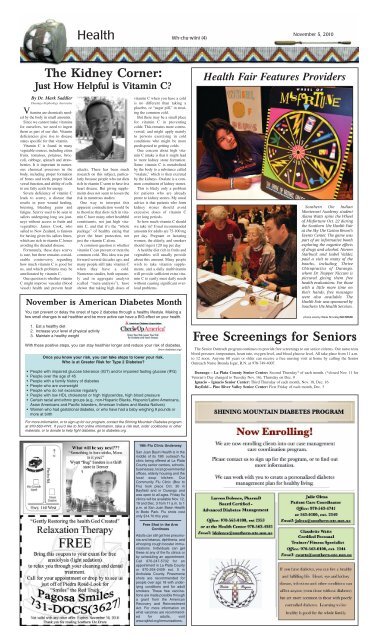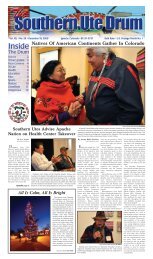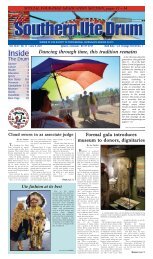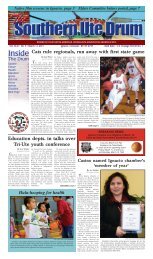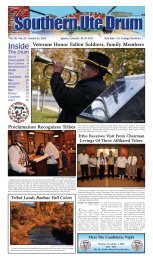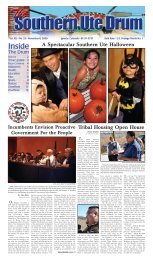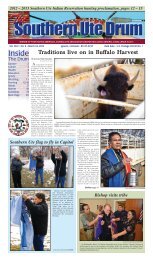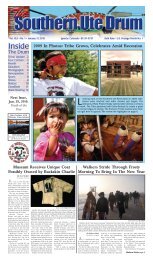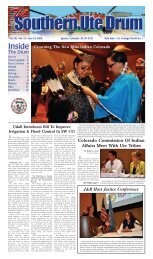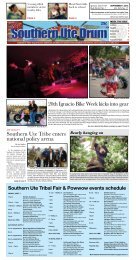November 5, 2010 - Southern Ute Indian Tribe
November 5, 2010 - Southern Ute Indian Tribe
November 5, 2010 - Southern Ute Indian Tribe
You also want an ePaper? Increase the reach of your titles
YUMPU automatically turns print PDFs into web optimized ePapers that Google loves.
<strong>November</strong> 5, <strong>2010</strong><br />
Health Wh-chu-wiini (4)<br />
The Kidney Corner:<br />
Just How Helpful is Vitamin C?<br />
By Dr. Mark Saddler<br />
Durango Nephrology Associates<br />
Vitamins are chemicals needed<br />
by the body in small amounts.<br />
Since we cannot make vitamins<br />
for ourselves, we need to ingest<br />
them as part of our diet. Vitamin<br />
deficiencies give rise to disease<br />
states specific for that vitamin.<br />
Vitamin C is found in many<br />
vegetable sources, including citrus<br />
fruits, tomatoes, potatoes, broccoli,<br />
cabbage, spinach and strawberries.<br />
It is important in numerous<br />
chemical processes in the<br />
body, including proper formation<br />
of bones and teeth, proper blood<br />
vessel function, and ability of cells<br />
to use fatty acids for energy.<br />
Severe deficiency of vitamin C<br />
leads to scurvy, a disease that<br />
results in poor wound healing,<br />
bruising, bleeding gums and<br />
fatigue. Scurvy used to be seen in<br />
sailors undergoing long sea journeys<br />
without access to fruits and<br />
vegetables. James Cook, who<br />
sailed to New Zealand, is famous<br />
for having given his sailors limes,<br />
which are rich in vitamin C, hence<br />
avoiding the dreaded disease.<br />
Fortunately, these days scurvy<br />
is rare, but there remains considerable<br />
controversy regarding<br />
how much vitamin C is good for<br />
us, and which problems may be<br />
ameliorated by vitamin C.<br />
One question is whether vitamin<br />
C might improve vascular (blood<br />
vessel) health and prevent heart<br />
attacks. There has been much<br />
research on this subject, particularly<br />
because people who eat diets<br />
rich in vitamin C seem to have less<br />
heart disease. But giving supplements<br />
does not seem to lessen the<br />
risk in numerous studies.<br />
One way to interpret this<br />
apparent contradiction would be<br />
to theorize that diets rich in vitamin<br />
C have many other healthful<br />
constituents, not just high vitamin<br />
C, and that it’s the “whole<br />
package” of healthy eating that<br />
gives the heart protection, not<br />
just the vitamin C alone.<br />
A common question is whether<br />
vitamin C can prevent or treat the<br />
common cold. This idea was put<br />
forward several decades ago, and<br />
many people still take vitamin C<br />
when they have a cold.<br />
Numerous studies, both separately<br />
and in aggregate analysis<br />
(called “meta-analysis”), have<br />
shown that taking high doses of<br />
vitamin C when you have a cold<br />
is no different than taking a<br />
placebo, or “sugar pill,” in treating<br />
the common cold.<br />
But there may be a small place<br />
for vitamin C in preventing<br />
colds: This remains more controversial,<br />
and might apply mainly<br />
to persons exercising in cold<br />
conditions who might be more<br />
predisposed to getting colds.<br />
One concern about high vitamin<br />
C intake is that it might lead<br />
to more kidney stone formation.<br />
Some vitamin C is metabolized<br />
by the body to a substance called<br />
“oxalate,” which is then excreted<br />
by the kidneys. Oxalate is a common<br />
constituent of kidney stones.<br />
This is likely only a problem<br />
for patients who are already<br />
prone to kidney stones. My usual<br />
advice is that patients who form<br />
kidney stones should avoid<br />
excessive doses of vitamin C<br />
over long periods.<br />
So how much vitamin C should<br />
we take in? Usual recommended<br />
amounts for adults are 75-100 mg<br />
per day. Pregnant or lactating<br />
women, the elderly, and smokers<br />
should ingest 120 mg per day.<br />
A healthy diet rich in fruits and<br />
vegetables will usually provide<br />
about this amount. Many people<br />
wish to take vitamin supplements,<br />
and a daily multivitamin<br />
will provide sufficient extra vitamin<br />
C to easily meet daily needs<br />
without causing significant overload<br />
problems.<br />
<strong>November</strong> is American Diabetes Month<br />
You can prevent or delay the onset of type 2 diabetes through a healthy lifestyle. Making a<br />
few small changes to eat healthier and be more active can have a BIG effect on your health.<br />
1. Eat a healthy diet<br />
2. Increase your level of physical activity<br />
3. Maintain a healthy weight<br />
With these positive steps, you can stay healthier longer and reduce your risk of diabetes.<br />
(from diabetes.org)<br />
Once you know your risk, you can take steps to lower your risk.<br />
Who is at Greater Risk for Type 2 Diabetes?<br />
• People with impaired glucose tolerance (IGT) and/or impaired fasting glucose (IFG)<br />
• People over the age of 45<br />
• People with a family history of diabetes<br />
• People who are overweight<br />
• People who do not excercise regularly<br />
• People with low HDL cholesterol or high triglycerides, high blood pressure<br />
• Certain racial and ethnic groups (e.g., non-Hispanic Blacks, Hispanic/Latino Americans,<br />
Asian Americans and Pacific Islanders, American <strong>Indian</strong>s and Alaska Natives)<br />
• Women who had gestational diabetes, or who have had a baby weighing 9 pounds or<br />
more at birth<br />
Health Fair Features Providers<br />
<strong>Southern</strong> <strong>Ute</strong> <strong>Indian</strong><br />
Montessori Academy student<br />
Alana Watts spins the Wheel<br />
of Misfortune Oct. 22 during<br />
the <strong>Southern</strong> <strong>Ute</strong> Health Fair<br />
at the Sky <strong>Ute</strong> Casino Resort’s<br />
Events Center. The game was<br />
part of an informative booth<br />
exploring the negative effects<br />
of drugs and alcohol. Noreen<br />
Starbuck and Isabel Valdez<br />
paid a visit to many of the<br />
booths, including Thrive<br />
Chiropractics of Durango,<br />
where Dr. Trapper Niccum is<br />
pictured giving them free<br />
health evaluations. For those<br />
with a little more time on<br />
their hands, free massages<br />
were also available. The<br />
Health Fair was sponsored by<br />
<strong>Southern</strong> <strong>Ute</strong> Health Services.<br />
photos Jeremy Wade Shockley/SU DRUM<br />
Free Screenings for Seniors<br />
The Senior Outreach program continues to provide free screenings to our senior citizens. Our nurse tests<br />
blood pressure, temperature, heart rate, oxygen level, and blood glucose level. All take place from 11 a.m.<br />
to 12 noon. Anyone 60 years or older can receive a free nursing visit at home by calling the Senior<br />
Outreach Nurse Brenda Isgar, R.N. at 970-749-4007.<br />
Durango – La Plata County Senior Center: Second Thursday* of each month, (*closed Nov. 11 for<br />
Veteran’s Day changed to Tuesday Nov. 16), Thursday on Dec. 9<br />
Ignacio – Ignacio Senior Center: Third Thursday of each month, Nov. 18, Dec. 16<br />
Bayfield – Pine River Valley Senior Center: First Friday of each month, Dec. 3<br />
For more information, or to sign up for our program, contact the Shining Mountain Diabetes program<br />
at 970-563-4741. If you’d like to find online information, take a risk test, order cookbooks or other<br />
materials, or to donate to help fight diabetes, go to diabetes.org.<br />
19th Flu Clinic Underway<br />
San Juan Basin Health is in the<br />
middle of its 19th outreach flu<br />
clinic being offered at La Plata<br />
County senior centers, schools,<br />
businesses, local governmental<br />
offices, elderly housing and the<br />
local soup kitchen. Our<br />
Community Flu Clinic (Boo to<br />
Flu) took place Oct. 30 in<br />
Bayfield and in Durango and<br />
was open to all ages. Friday flu<br />
clinics will be available Nov. 12,<br />
19 and Dec. 3 from 11 a.m. to 1<br />
p.m. at San Juan Basin Health<br />
in Bodo Park. Flu shots cost<br />
only $14.70 this year.<br />
Free Shot in the Arm<br />
Continues<br />
Adults can still get free pneumonia<br />
and tetanus, diphtheria, and<br />
whooping cough booster immunizations.<br />
Individuals can get<br />
these at any of the flu clinics or<br />
by scheduling an appointment.<br />
Call 970-247-5702 for an<br />
appointment in La Plata County<br />
or 970-264-2409 ext. 0 in<br />
Archuleta County. Pneumonia<br />
shots are recommended for<br />
people over age 18 with underlying<br />
conditions and for adult<br />
smokers. These free vaccinations<br />
are made possible through<br />
a grant from the American<br />
Recovery and Reinvestment<br />
Act. For more information on<br />
what vaccines are recommended<br />
for adults, visit<br />
www.sjbhd.org/immunizations.


